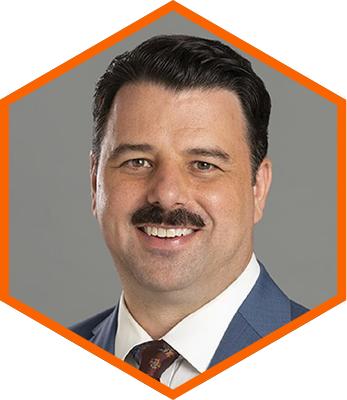
Jonathan Seymour
Bankruptcy scholar brings insights from practice to study of courts and culture
Jonathan Seymour’s research focuses on the distinct legal culture of bankruptcy courts that he encountered over five years as a litigator and how the unwritten practices of judges and practitioners influence the governance of both commercial and consumer reorganizations.
Seymour, who has taught and researched at Duke for the last three years through the Law School’s Visiting Assistant Professor (VAP) program, is joining the Duke Law faculty as an associate professor of law. He will teach Contracts and continue a seminar he has taught for the last two years, Current Debates in Bankruptcy Law.
“Having had the pleasure of mentoring and also co-authoring an article with Jonathan, I find him a highly gifted young scholar who combines keen intellect with real insight and judgment,” said Steven L. Schwarcz, the Stanley A. Star Distinguished Professor of Law & Business. “Unlike most other scholars in the field, he addresses both corporate and consumer bankruptcy as well as important comparative insolvency-law issues. Furthermore, Jonathan’s a truly delightful and empathetic colleague who epitomizes the ethical definition of wisdom, ‘Who is wise? He who learns from all people.’”
A native of the United Kingdom and a graduate of Oxford University and George Washington Law, Seymour developed an interest in bankruptcy during a judicial internship his 1L summer. (An early assignment was a memo on Stern v. Marshall, a 2011 Supreme Court decision that curtailed the power of bankruptcy judges on constitutional grounds.) As a first-year associate at WilmerHale in Washington, D.C., he found himself engaging with bankruptcy scholarship as he researched a policy report on proposed reforms to chapter 11 of the Bankruptcy Code. Later, as he litigated cases on behalf of creditors, he wondered why bankruptcy judges weren’t more uniform in their application of the law and why his clients often lost at trial in bankruptcy court but won on appeal.
“Jonathan’s fantastic bankruptcy work is informed by his years of practice experience and it shows. His insights are novel and important.”
— Professor Sara Greene
“I kept building up this store of unanswered threads in my head that I wanted to keep pulling on,” he says. “Academia seemed like the place where I could continue to think and research and write about bankruptcy without the time constraints that I had in practice, and where I’d get to teach as well, which is something that I really enjoy doing.”
Seymour has developed a research agenda informed by his time in practice, when he saw how “judges and lawyers in a purportedly uniform federal system in fact frequently talk past each other.” Bankruptcy courts have developed practices that give judges the flexibility to manage intricate cases, resolve them quickly, and maximize value for stakeholders, he says. But in business bankruptcy, this unwritten law tends to favor sophisticated litigants who appear frequently and can maneuver the case in a direction that favors their clients. It can also produce “rough justice,” in which decisions made in pursuit of the most efficient outcomes don’t jibe with broader legal principles or methods of interpreting statutes, including those followed in appellate courts and the Supreme Court.
In “Against Bankruptcy Exceptionalism,” 89 University of Chicago Law Review (forthcoming 2022), Seymour uses the court-approved reorganization plan of Purdue Pharma to illustrate the problem. The plan included a third-party release that shielded the controlling Sackler family from future civil liabilities relating to Purdue’s role in the opioid crisis, including thousands of lawsuits in which states and individuals are seeking trillions of dollars in damages. Critics of the company objected and the district court rejected the release on appeal, setting up a high-stakes decision from the court of appeals later this year, but such protection from third-party claims isn’t unusual in large and complicated bankruptcies, Seymour notes.
“Purdue’s plan straightforwardly cohered with deeply-rooted norms within bankruptcy culture on the best approach to resolving complex bankruptcy disputes, and likewise reflected the direction in which Purdue, as debtor-in-possession, had been steering the case from the beginning,” he writes. “In the bankruptcy world, it is the district court’s decision, not the proceedings in bankruptcy court, that is the outlier.
“Everywhere in bankruptcy, judges alter rights, create remedies, and steer cases out of fidelity to unwritten norms that seek to advance what those within the bankruptcy culture understand to be the better and more efficient functioning of the bankruptcy system.”
In the article, Seymour discusses a variety of potential solutions to the problems created by the special treatment of bankruptcy, including reforming the appeals process, changing venue rules, and balancing the bench with judges from other areas of practice. But his scholarship has not been limited to examining the exceptional nature of bankruptcy.
In “Corporate Restructuring under Relative and Absolute Priority Default Rules: A Comparative Assessment,” 2021 University of Illinois Law Review 1, he and Schwarcz analyze a European Commission proposal that courts handling corporate insolvencies, in contrast to U.S. bankruptcy courts, have the option of allowing junior creditors or shareholders to recover payment even before senior claims have been paid in full, so long as senior classes have been treated more favorably. They write that the European rule, known as relative priority, would be “antithetical to fairness,” and “will scramble the usual incentives that shape bargaining in insolvency, which takes place in the shadow of an absolute priority rule default rule.” Seymour, who spent a year studying German law at the University of Bonn as an undergraduate, says he hopes to apply a comparative lens to other bankruptcy questions with future projects.
His writing on consumer bankruptcy issues also builds on his practice experience. In “The Limited Lifespan of the Bankruptcy Estate: Managing Consumer and Small Business Reorganizations,” 37 Emory Bankruptcy Developments Journal 1 (2020), he examines the court’s supervision of debtors’ assets following reorganization, which in some jurisdictions lasts for the duration of the debtor’s five-year repayment plan. Seymour argues for a “light-touch approach” that minimizes court oversight and thereby reduces the burdens and costs on debtors as they attempt to rebuild their finances.
“Duke Law School is extraordinarily lucky to have Jonathan Seymour join us,” said Professor Sara Sternberg Greene, who studies the relationship between law, poverty, and inequality and teaches a course focused on the consumer bankruptcy system. “Jonathan’s fantastic bankruptcy work is informed by his years of practice experience and it shows. His insights are novel and important. Jonathan is also a true pleasure to have as a colleague and I am thrilled he will be joining us.”
Seymour, who says a unifying theme of his research in the commercial and consumer spheres is a belief in “modesty about what bankruptcy’s role is,” plans to explore the implications of a light-touch bankruptcy system in future projects. He thinks bankruptcy would ultimately benefit if it weren’t seen as a space apart from the law that is too complex for other practitioners and courts to understand, and instead was in constant conversation with other areas of the law about, for example, statutory interpretation.
“We can have a workable Bankruptcy Code and a Bankruptcy Code that may work better than the code we have now if we use the same methods of statutory interpretation that the Supreme Court uses cutting across federal statutes, and that with some margin of appreciation, district courts and courts of appeals use in non-bankruptcy statutory interpretation cases,” he says.
“If I’m right in that claim, then bankruptcy obviously has a lot to learn from how other fields do statutory interpretation. But I also think generalist statutory interpretation could be sharpened by looking at some of the kind of really hard problems that you get when you’re trying to deal with an integrated statute, like the Bankruptcy Code.”
When Seymour arrived at Duke in 2019, he didn’t know that his time in the VAP program — which supports emerging scholars interested in appointment as tenure-track members of a law faculty with research support and feedback and an opportunity to hone their teaching skills — would coincide with a pandemic. But, he says, he wouldn’t hesitate to recommend the program to other aspiring academics.
“The wonderful thing has been how many people on the faculty were interested in reading my work, talking about my work, and supporting me on the job market, and that experience persuaded me even before I went on the market [that] the dream situation at the end of the day would be an offer to stay on a Duke,” he says. “Very happily, that’s where things ended up.”












